The paper analyses the roles and functions of the military and civilian police and comes to the conclusion that either the disbanding or amalgamation of the military in small developing countries would denude the state's capability of providing a stable National Security environment. It suggests that transformation of the military to be more relevant to the developing economies is more appropriate. The link of the hemispheric threats of the nation states of the Caribbean, to National Security and the differing roles of the police and military services is investigated and it is argued that the concomitancy of appropriate training to functions is critical and herein lies one of the major impediments to amalgamation. The paper argues that discipline is the foundation of military combat readiness and combat effectiveness and is more important in today's complex security environment of asymmetric threats from non-state actors where the "release aggression, restrain excess" paradox is most relevant.

